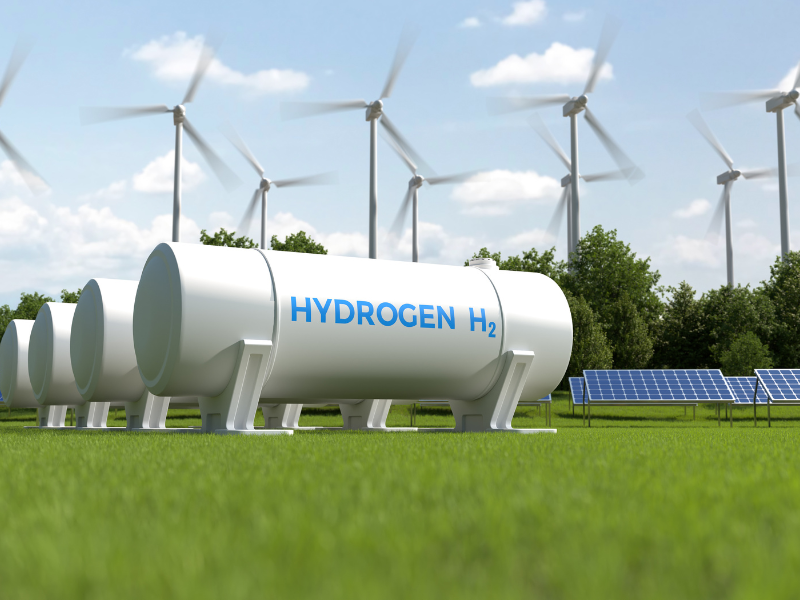In today’s world, the need for alternative sources of energy has become more crucial than ever. With the looming threat of climate change and the depletion of traditional fossil fuels, alternative energy companies have emerged as the driving force behind a sustainable future. These companies are at the forefront of developing innovative solutions that harness renewable energy sources and minimize environmental impact.
In this article, we will explore the role of alternative energy companies in revolutionizing the energy landscape and highlight some of the key players in the industry.
The importance of alternative energy companies

Alternative energy companies play a pivotal role in addressing the urgent need for sustainable energy solutions. With traditional fossil fuels depleting and causing harmful greenhouse gas emissions, alternative energy sources offer a cleaner and more environmentally friendly alternative. These companies focus on harnessing renewable energy sources such as solar, wind, hydroelectric, geothermal, biomass, tidal, and wave energy. By diversifying the energy mix, they reduce dependency on finite resources and minimize the impact on climate change.
Solar energy: Harnessing the power of the sun

Solar energy is one of the most prominent forms of alternative energy. Solar panels convert sunlight into electricity using photovoltaic cells, with no emissions or harmful byproducts. Companies specializing in solar energy installation and manufacturing have made significant advancements in increasing the efficiency and affordability of solar panels. As a result, solar energy has become increasingly accessible for residential, commercial, and industrial applications.
Wind energy: Tapping into nature’s force

Wind energy is another renewable resource that alternative energy companies are tapping into. Wind turbines convert the kinetic energy of wind into electricity, providing clean power without emissions or pollution. These turbines are now larger and more efficient, capable of producing a significant amount of energy. Companies in the wind energy sector are creating innovative designs and establishing wind farms in areas with favorable wind conditions to maximize electricity production.
Hydroelectric power: Utilizing the force of water

Hydroelectric power is derived from the flow of water in rivers and dams. Alternative energy companies harness this force to generate electricity through turbines. Hydroelectric power plants have been in operation for decades and are considered a reliable and established form of renewable energy. These companies are now exploring more efficient methods, such as smaller-scale hydroelectric systems and run-of-river plants, to minimize environmental impact and preserve aquatic ecosystems.
Geothermal energy: Harnessing the Earth’s heat
Geothermal energy utilizes the Earth’s natural heat to generate electricity or heat buildings directly. Alternative energy companies tap into geothermal reservoirs by drilling deep into the Earth’s surface. Geothermal power plants produce emission-free electricity and can operate continuously, making them a reliable and sustainable energy source. Companies in this sector are continually improving drilling techniques and exploring new geothermal regions to expand the geothermal energy potential.
Biomass energy: Converting waste into power
Biomass energy involves using organic matter, such as crop residue, wood chips, or organic waste, to generate heat or electricity. Alternative energy companies are developing technologies that convert these biomass sources into energy through processes like combustion, gasification, or anaerobic digestion. These companies are also exploring advanced methods such as pyrolysis and torrefaction to increase energy yields and reduce emissions.
Tidal and wave energy: Capturing the motion of the ocean
Tidal and wave energy harness the power of ocean tides and waves to generate electricity. Alternative energy companies are developing technologies such as tidal barrages, tidal turbines, and wave energy converters to capture this energy. By utilizing the constant motion of the ocean, these companies are creating renewable and predictable sources of electricity.
Innovations in energy storage: Overcoming the intermittent nature of renewables
One of the challenges with renewable energy sources is their intermittent nature. Alternative energy companies are investing in energy storage technologies to overcome this limitation. Innovations in battery storage, pumped hydroelectric storage, and compressed air energy storage are making it possible to store excess energy generated during peak production periods and distribute it during times of high demand. These advancements contribute to a more reliable and stable energy supply.
Electric vehicles: Transforming transportation
Alternative energy companies are not limited to generating electricity; they also focus on electric vehicle (EV) technology. Electric cars offer a greener mode of transportation by reducing carbon emissions from traditional gasoline-powered vehicles. Companies in this sector are developing advanced batteries, expanding charging infrastructure, and enhancing the range and affordability of electric vehicles. This transition towards electric mobility plays a significant role in reducing air pollution and dependence on fossil fuels.
Sustainable architecture: Building with renewable materials
Alternative energy companies are extending their reach beyond traditional energy generation to sustainable architecture. They are championing the use of renewable and eco-friendly materials in construction projects. From energy-efficient building designs to the incorporation of solar panels and green roofs, these companies are driving the adoption of sustainable practices in the construction industry.
The role of government incentives in promoting alternative energy
Government incentives and policies play a crucial role in promoting the growth of alternative energy companies. Providing tax credits, grants, low-interest loans, and feed-in tariffs incentivize businesses and individuals to invest in renewable energy projects. These incentives reduce the financial burden and accelerate the adoption of alternative energy sources, driving the expansion of the industry.
Investment opportunities in alternative energy companies
The increasing demand for alternative energy solutions presents lucrative investment opportunities. Alternative energy companies offer investors the chance to contribute to a sustainable future while potentially earning attractive returns. Investing in renewable energy infrastructure projects, solar and wind farms, energy storage companies, and electric vehicle manufacturers can diversify portfolios and align investments with environmental and social values.
Overcoming challenges in the alternative energy industry
While alternative energy companies are revolutionizing the energy sector, they face several challenges. These include high upfront costs, regulatory barriers, intermittency issues, and public acceptance. However, technological advancements and supportive policies are gradually addressing these challenges, paving the way for increased adoption of alternative energy solutions.
The future of alternative energy companies
The future of alternative energy companies looks promising as society becomes more aware of the pressing need for sustainable energy practices. Ongoing investments in research and development, coupled with improving economies of scale, will continue to drive down costs and make alternative energy sources more competitive. As the world transitions towards a cleaner energy future, alternative energy companies will play a vital role in creating a sustainable and low-carbon society.
FAQs

Q: How do alternative energy companies contribute to reducing greenhouse gas emissions?
A: Alternative energy companies provide clean energy solutions that produce little to no greenhouse gas emissions, reducing the carbon footprint associated with traditional energy sources.
Q: Are alternative energy companies profitable?
A: Many alternative energy companies have demonstrated profitability, especially as the demand for renewable energy continues to grow. However, like any industry, profitability can vary depending on market conditions and individual company performance.
Q: How can individuals support alternative energy companies?
A: Individuals can support alternative energy companies by installing solar panels, investing in renewable energy projects, adopting electric vehicles, and advocating for supportive government policies.
Q: What role does research and development play in alternative energy companies?
A: Research and development are crucial for alternative energy companies to drive innovation, enhance energy conversion technologies, improve efficiency, and discover new renewable energy sources.
Conclusion
Alternative energy companies are at the forefront of combating climate change and fostering a sustainable future. By harnessing renewable energy sources, these companies are driving the transition towards clean and environmentally friendly energy solutions.
From solar and wind power to geothermal and tidal energy, alternative energy companies cover a wide spectrum of technologies that are reshaping the energy landscape. With continued investments, supportive policies, and increasing public awareness, alternative energy companies will continue to play a pivotal role in creating a more sustainable and greener world.




